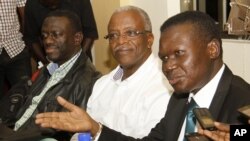Human Rights Watch called on Ugandan authorities Monday to stop obstructing peaceful political gatherings, especially with the use of teargas, saying such interference violates people's rights to free assembly and expression.
"Ugandans have the right to gather and hear information, never more so than when an election is coming up," Maria Burnett, senior Africa researcher at HRW, said. "The reckless use of teargas is injuring people and jeopardizing a free and fair democratic atmosphere for campaigns."
Uganda is holding a presidential election next year with campaigning set to begin November 9. Ugandans have cited frequent use of force by police to prevent opposition leaders from addressing rallies or meeting their supporters.
Last week, the main opposition leader, Kizza Besigye, accused President Yoweri Museveni of instigating violence against opponents. That included an alleged incident in which police stripped naked a female member of Besigye's team and threw her in the back of a truck. Besigye said such actions are meant to intimidate and send the message to women that they should not be politically active, while also causing fear in the general population.
Another opposition candidate, former prime minister Amama Mbabazi, issued a statement condemning that incident.
Mbabazi's rallies have also been targeted by police. In September police used teargas to disperse people who gathered to hear Mbabazi speak in the towns of Soroti and Jinja. HRW said it interviewed 40 people there shortly after the event and dozens said they were injured or felt ill from the gas, while some were injured by rubber bullets or beatings.
HRW said teargas should only be used as a proportionate response when needed to stop violence. It called on Uganda's development partners, including the United States, Britain, the European Union and Ireland, to publicly support a call for guidelines on the use of teargas that meet international law.





